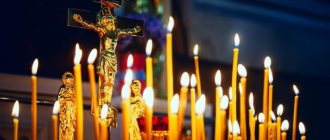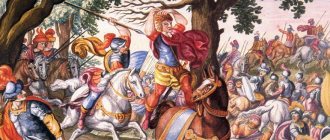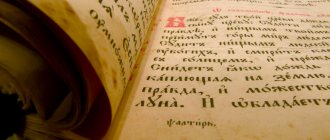The merciful One Creator gave man many ways of communicating with Him, including prayers and chants. The latter also include works included in the Psalter. Popular ones include the collection of Solomon, as well as the king and prophet David. The latter has many verses of praise, including Psalm 4.
Tested over centuries, this kathisma allows Orthodox believers to find consolation in difficult moments of life, to cry out to heaven even when it is difficult to do so in their own words.
Text of prayer Psalm 4
When conducting services, the Church Slavonic or Old Church Slavonic language is used. With its help, prayer reaches the Lord and conveys the requests and pleas of believers
In Church Slavonic
Finally, in the songs of a psalm to David
1 Always call upon me; the God of my righteousness heard me, and in affliction thou didst spread me, be merciful to me, and hear my prayer.
2 Sons of mankind, how long is heaviness of heart? Do you love vanity and seek lies?
3 And bear in mind that the Lord has surprised His venerable one: the Lord will hear me whenever I cry to Him.
4 Be angry, and do not sin as you say in your hearts; on your beds be moved.
5 Eat the sacrifice of righteousness and trust in the Lord.
6 Many say: Who will show us good? The light of Your face shines upon us, O Lord.
7 Thou hast given gladness to my heart: by the fruit of wheat, wine, and oil, I have multiplied.
8 In peace together I will sleep and rest, for You, O Lord, alone have given me hope.
In Russian
If you read Psalm 4 in Russian, then the experiences and suffering of the singer, his confusion and desire to find the protection of the Lord become more understandable:
For performance, on strings. Song of David.
1 When I called, the God of my righteousness heard me; in tightness You gave me space. Have pity on me and hear my prayer.
2 Sons of men, how long are you heavy-hearted? Why do you love vanity and seek lies?
3 And know that the Lord has made His holy one marvelous. The Lord will hear me when I cry to Him.
4 Be angry, but do not sin in what you say in your hearts; on your beds lament.
5 Offer the sacrifice of righteousness and trust in the Lord.
6 Many say, “Who will show us good?” – The light of Your face has marked us, O Lord!
7 You have given joy to my heart; they are filled with the fruit of the wheat, their wine, and their oil.
8 I will lie down in peace and immediately fall asleep, for You, Lord, have given me alone to live with hope.
Help from the Orthodox Psalm 33 for those reading it - Philosophy
The text of Psalm 33 in the Orthodox Psalter is preceded by the following unusual inscription: “A Psalm of David, when he pretended to be mad before Abimelech and was driven away from him and withdrew.”
Such a preface immediately suggests that this song was written on the basis of some historical event. Abimelech is not a name, but a title of the Philistine king, whose name was Achish.
It is known that David, as the conqueror of Goliath, was presented to Achish, and in order to get rid of the obsessive attention of the Philistine ruler, he was forced to pretend to be crazy.
Important
The interpretation of Psalm 33 explains the words “Come, children” (Ps. 33:12) in this way: having run away from Abimelech and finding himself on the street, David was surrounded by a crowd of children, but in order not to disturb his image of a madman, he was forced to continue the game, for which the children ridiculed him cruelly.
Already being a king, David greatly regretted this incident, because, in his opinion, he had lowered himself in the eyes of the younger generation, and the words “Come, children, I will teach you the fear of the Lord” indicate that he is ready to correct the mistake.
Read the text in Russian prayer Psalm 33
Psalm of David, when he feigned madness before Abimelech and was driven away from him and withdrew.
I will bless the Lord at all times; His praise is continually in my mouth. In the Lord my soul will glory; The meek will hear and rejoice. Magnify the Lord with me, and let us exalt His name together. I sought the Lord, and He heard me, and delivered me from all my dangers. Those who turned their gaze to Him were enlightened, and their faces would not be ashamed.
This beggar cried out, and the Lord heard and saved him from all his troubles. The Angel of the Lord encamps around those who fear Him and delivers them. Taste and see how good the Lord is! Blessed is the man who trusts in Him! Fear the Lord, all you His saints, for there is no poverty among those who fear Him. The Skimns are in poverty and suffer hunger, but those who seek the Lord do not suffer the need for any good.
Come, children, listen to me: I will teach you the fear of the Lord. Does a person want to live and does he love long life in order to see good? Keep your tongue from evil and your lips from deceitful words. Avoid evil and do good; seek peace and follow it. The eyes of the Lord are on the righteous, and His ears are on their cry.
We recommend studying Psalm 96
But the face of the Lord is against those who do evil, to destroy the memory of them from the earth. The righteous cry, and the Lord hears, and delivers them from all their sorrows. The Lord is close to the brokenhearted and will save the humble in spirit. The righteous has many sorrows, and the Lord will deliver him from all of them. He keeps all his bones; not one of them will be crushed.
Evil will kill the sinner, and those who hate the righteous will perish. The Lord will deliver the soul of His servants, and none of those who trust in Him will perish.
Psalter, read Psalm 33 in Church Slavonic
I will bless the Lord at all times; I will make his praise in my mouth. My soul will glory in the Lord; let the meek ones hear and rejoice. Magnify the Lord with me, and let us exalt his name together. I sought the Lord, and heard me and delivered me from all my sorrows. Come to it and be enlightened, and your faces will not be ashamed.
This beggar cried out, and the Lord heard and saved him from all his sorrows. The angel of the Lord will encamp around those who fear him and deliver them. Taste and see that the Lord is good; Blessed is the man who trusts in Nan. Fear the Lord, all you saints, for there is no hardship for those who fear him. The rich became poor and hungry; Those who seek the Lord will not be deprived of any good.
Come, children, listen to me, I will teach you the fear of the Lord. Who is a person who loves life and sees good things? Keep your tongue from evil and your lips from uttering flattery. Avoid evil and do good; seek peace and marriage and... The eyes of the Lord are upon the righteous, and his ears are upon their prayer.
Advice
The face of the Lord is against those who do evil, even to consume their memory from the earth. The righteous cried out, and the Lord heard them and delivered them from all their sorrows. The Lord is near to those who are broken in heart, and will save those who are humble in spirit. Many are the sorrows of the righteous, and the Lord will deliver me from all of them. The Lord protects all their bones, not one of them will be broken.
The death of sinners is cruel, and those who hate the righteous will sin. The Lord will deliver the souls of his servants, and all who trust in him will not sin.
History of writing
The exact time when Psalm 4 was written has not been established, but it is certain that its author was David. From it it is clear that the story is about a difficult time in the life and reign of King David. There were many dissatisfied people, but the source of this discontent is unknown. Perhaps this is a war or an escape from Abbesalom, the son of David, who sought to take his father’s throne during David’s lifetime - there are no exact indications of this.
Opinions vary regarding the events that inspired the song. However, everyone agrees that at this time David was overwhelmed with experiences and suffering, but constantly turned to the Lord, trusting in his help and protection.
At the same time, life testified that the king was constantly under the protection of the Almighty: there was always a way out of the most difficult situations, and David remained alive and healthy even after the most difficult battles. And during the period discussed in Psalm 4, David is confident that he will definitely receive the support of the Lord.
Why do they read?
When and to whom it is better to read the twenty-seventh hymn - there are different opinions on this matter.
It is believed to help those who:
- suffers from nervous disorders;
- found himself in a difficult financial situation;
- needs to acquire Christian humility.
However, one cannot consider a verse a kind of spell or attribute magical properties to it. First of all, it is prayer. Therefore, it will be useful to recite any chapter from the Psalter, in particular the psalm in question.
Why is Psalm 4 read?
Reading a prayer is appropriate when a person has a feeling of hopelessness from the problems that have piled up, if it is difficult for him to cope with despair and negative emotions, if his faith is weakening. When illnesses overcome, and financial problems seem insoluble, the words of prayer addressed to the Lord will help. In order for requests to reach the Lord, you need to read the text of Psalm 4 with complete trust in God and an open heart.
The prayer is suitable for reading to people who are nervous and unbalanced, constantly worried about every little thing, fussy, constantly sorting things out. To get rid of empty vanity and unnecessary anxiety, it is important to turn to the Lord, pacifying your anger.
Interpretation
In order to more deeply feel the whole tragedy of the situation that David narrates, an interpretation is required: the opportunity to gain strength and find the protection of God. The interpretation reveals the deep meaning of Psalm 4.
- Verse 1: David speaks directly to God and asks to hear his prayer. The disasters that befall a person are the result of his lack of faith in the Lord. To get rid of these “shackles”, you need to turn to God.
- Verse 2: In it the king wonders why the “sons of men” live in lies and vanity when they can be in peace and quiet.
- Verse 3: The king calls on his people to turn to God and admire his works, to believe in his power and the works of the Lord, just as he believes that God will not leave them without help and support.
- Verse 4-5: It is a call to come to your senses and repent. Everyone is free to express their thoughts and disagreement, without breaking the laws of God and without stooping to sin. To accuse, you need to analyze the situation and find out how justified the condemnation and anger are, whether the guilt of the one who is accused of all sins has been proven.
- Verses 6-8: filled with sincerity, bright feelings and faith in God. He helped when David’s circle was on the verge of despair due to a lack of understanding of what was happening and “daily bread.” It was at this time that God's help came. And although all problems are still far from being resolved, the king is completely confident in the mercy of the Lord, so he calmly goes to bed, despite the unfriendly surroundings.
( 1 ratings, average: 5.00 out of 5)
Interpretation of Psalm 148 by Theodoret of Cyrus
The interpretation of sacred books was carried out by saints from different eras.
That is why in Orthodoxy the Holy Scriptures (the Bible, Psalms, Gospels, etc.) are revered along with patristic traditions (interpretations). One of the earliest interpretations of the Psalter was compiled by Bishop Theodoret of Cyrus of Antioch (393-457 AD). The theologian explains each verse of the psalm. Hallelujah
An appeal to greater zeal of the soul to sing songs to the Creator. The exclamation, which in this context can be translated as “All together!”
1 Praise the Lord from heaven, praise him in the highest.
Moses teaches that the Lord created two heavens. One along with the Earth, he commanded the other to be among the waters and called it the firmament. David calls upon the Lord to sing songs from heaven and on high, that is, to the disembodied faces that dwell in both heavens. The prophet calls on the angels to join in singing and praise the Lord with him.
2 Praise him, all his angels: praise him, all his might.
Now the prophet turns to certain angelic ranks: Power and Strength, because they are mighty in strength, doing His word (Ps. 103:20).
3 Praise Him, O sun and moon; Praise Him, all you stars of light.
Theodoret of Cyrus cites the previous description of Symmachus: praise all the stars of light, but in the translation of the Seventy it turns out differently. God created light on the first day, and the heavenly bodies on the fourth. That is why the prophet David mentioned the light separately and calls upon the sun, moons and stars additionally, addressing them as animate and verbal creations. At the same time, he addresses people, urging them to look at the heavenly bodies as creations of God’s wisdom and to tirelessly praise the Lord.
4 Praise Him, the heavens of heavens: and the waters are above the heavens.
God divided the watery nature into the firmament and commanded the solar fire to move through the hardened waters. This way the fire does not go out and the hardened water does not evaporate. King David refers to heaven in the plural, according to the rules of the Hebrew language, according to which the word heaven is not used in the singular.
5 Let them praise the name of the Lord, for He commanded, and they were created;
David says that it is worthy to glorify the Creator, who created with the Word and created in the beauty that we see.
6 He established them forever and ever; gave a statute that will not pass away.
And he not only created, but also continues to think about creation, due to which all creatures, animate and inanimate, continue to exist as long as He pleases. And everyone fulfills His laws: the sea does not overflow its banks, day and night follow each other. Only people neglect God's laws.
7 Praise the Lord from the earth, you great fish and all the deeps,
By great fish we mean whales that live in the seas - parts of the earth. Great is the wisdom of the Creator, who imprisoned huge animals in the seas, showing their power, but protecting people from them so that they would not be harmed.
8 Fire and hail, snow and fog, a stormy wind that fulfills His word,
Fire can appear not only on the ground, but also form in the air in the form of lightning and fireballs. Snow, hail and fog come from water; storms, which David calls a stormy spirit, also refer to atmospheric phenomena due to the difference in pressure and humidity. Such phenomena obey God, but do not behave like something animate and intelligent.
9 the mountains and all the hills, the fruit trees and all the cedars,
Thank you to the Lord not so much from amazement at the greatness of His creatures, but also from the benefits to man - extensive and varied.
10 beasts and all livestock, creeping things and winged birds,
David separates the fierce beasts from the meek, but encourages both to praise the Lord, because there is not a single creature that is useless or superfluous, although this is hidden from our knowledge.
11 The kings of the earth and all the nations, the princes and all the judges of the earth,
The prophet calls on kings, nations, princes and judges to glorify the Lord.
12 youths and maidens, elders and youths
May immature and overripe age also praise the Lord.
13 Let them praise the name of the Lord, for His alone is exalted, His glory is on earth and in heaven.
They praise the name of the Lord, because the memory of other false gods has faded, and the only One who exists will not pass through the centuries, not only in heaven, but also on earth.
14 He has exalted the horn of His people, the glory of all His saints, the children of Israel, the people who are close to Him.
The Lord will exalt the people who honor Him. A horn is a fortress; King David refers to the likeness of animals armed with horns. God will make this people not only strong, but also revered. The Lord will give glory to the children of Israel and the people close to Him. Further, Theodoret of Cyrus writes that the celebrity passed with piety, and the Israelites lost that glory, but the pagans will receive the gifts of God. The theologian foresaw the spread of the Orthodox faith throughout the world, and people who were pagans in the 4th century would become pious Christians.







